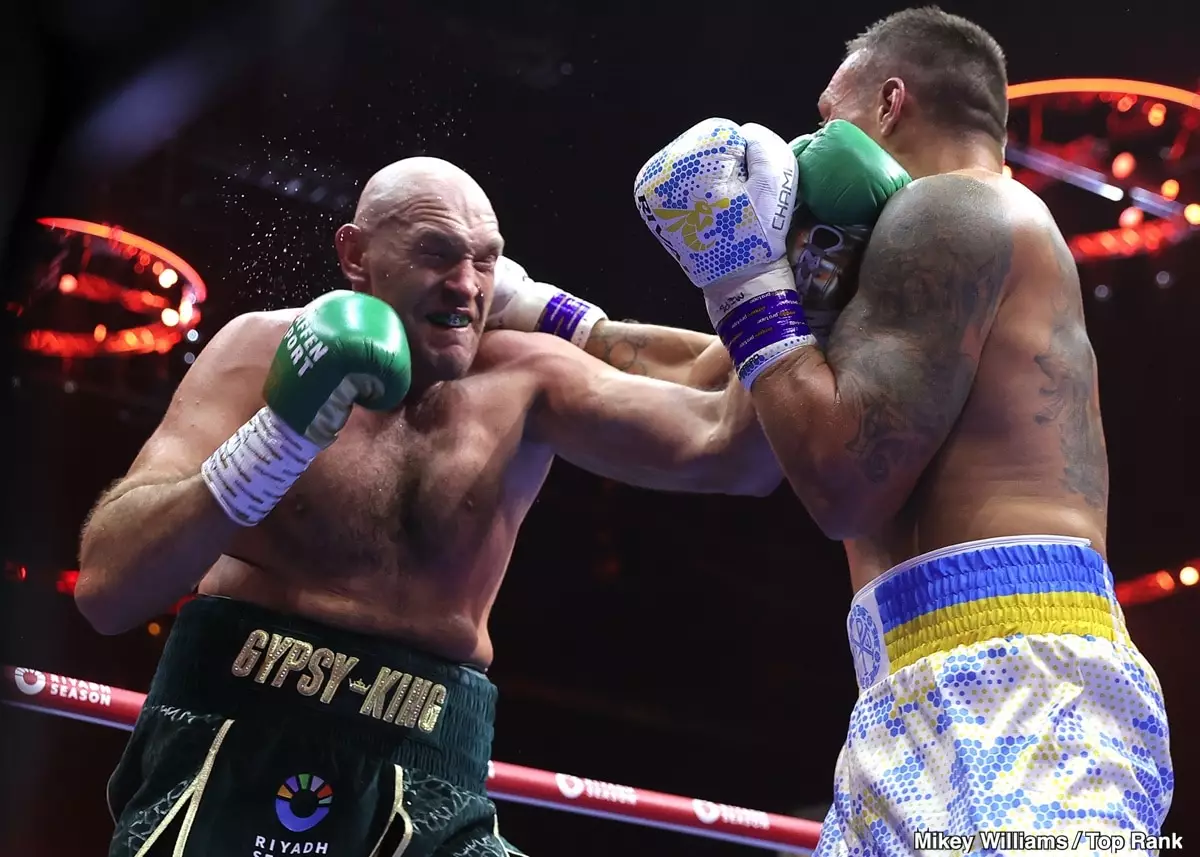Tyson Fury is once again preparing to step into the ring, this time for a highly anticipated rematch against Oleksandr Usyk scheduled for December 21st in Riyadh, Saudi Arabia. With a looming sense of urgency, Fury has stated that he must score a knockout to reclaim victory after suffering a split decision loss to Usyk earlier this year. However, there are many aspects to consider as we analyze Fury’s preparation, mindset, and the overall landscape of heavyweight boxing ahead of this clash.
Fury’s Physical Deterioration
One of the most concerning aspects for Fury leading into this rematch is his physical condition. His last fight against Usyk revealed a fighter who appeared noticeably past his prime—out of shape, sluggish, and unable to keep pace with Usyk’s speed. Comparatively, the Fury that delivered a stunning performance against Deontay Wilder in their second encounter in 2020 was a completely different athlete. This transformation raises questions about his training regimen and overall fitness strategies in the months following that fight.
Fury’s comments indicate a lack of self-awareness regarding his recent performance fluctuations. While he seems determined to regain his championship form, one can’t help but wonder if he has genuinely acknowledged the decline. In his interviews, there’s a visible reluctance to confront the implications of his age and declining punch resistance. For a heavyweight, speed and agility are essential attributes, and the need to reclaim these characteristics should be at the forefront of his preparation.
In the aftermath of his defeat to Usyk, Fury has shown signs of cognitive dissonance regarding the fight outcomes. He insists that he was unfairly treated, tenaciously clinging to the belief that he was the true victor. This refusal to concede that Usyk outperformed him may lead to a stagnation in his development as a fighter. Acceptance of one’s weaknesses often serves as a catalyst for improvement; without it, Fury may struggle to adapt his strategies for this rematch.
It’s worth noting how competitive sports often mirror psychological battles. The mindset in which a fighter approaches the ring can significantly impact their performance. Fury’s insistence that he should have won the first bout could manifest as overconfidence or reckless aggression in the rematch rather than strategic fighting. He must avoid the pitfall of ignoring the skills that Usyk demonstrated, which could leave him vulnerable once more.
The Bounty of Big Paydays
Another intriguing dynamic influencing this rematch is the apparent safety net that Fury feels he possesses. Prominent figures in the boxing world, including His Excellency Turki Alalshikh, have provided assurances that Fury will still secure a lucrative matchup against Anthony Joshua, even in the case of a loss to Usyk. This aspect potentially diminishes the stakes for Fury in a highly competitive sport where the drive for victory traditionally fuels fighters’ hunger.
While many boxers face a pressure cooker environment where a loss can derail their career, this cushy setup may hamper Fury’s motivation to perform at his peak. It raises questions about the integrity of competition when some fighters can afford to enter the ring without the fear of losing their place in the spotlight. If Fury views this rematch as inconsequential, it could profoundly undermine his performance.
Fury’s assertion that he needs to “knock him out” reflects a common miscalculation that can occur when transitioning to face a fighter of Usyk’s caliber. Usyk is not an inexperienced opponent; he is a seasoned champion with impressive footwork and defensive skills. Fury’s previous success against Deontay Wilder—a fighter who often relied on his raw power—was predicated on his ability to leverage size and aggression, yet that strategy may not translate against an opponent as technically proficient as Usyk.
The notion that Fury will be able to replicate the success he had against Wilder is perhaps overly optimistic. Fury may find that the methods that worked against opponents reliant on brute force will fail dramatically when faced with a skillful and agile technician like Usyk. The use of grappling and leaning might have sufficed in earlier contests, but they are unlikely to phase Usyk, whose reflexes and fight IQ are on another level.
As Tyson Fury prepares for this crucial rematch, he must engage in candid self-reflection regarding his performance, physical condition, and preparedness to face Oleksandr Usyk again. The clock is ticking, and if he does not address these critical elements, he may very well find that the second bout results in a similar outcome to the first. For Fury, overcoming psychological hurdles, recognizing physical limitations, and fully committing to this challenge are paramount if he is to reclaim his place as a premier heavyweight champion.

